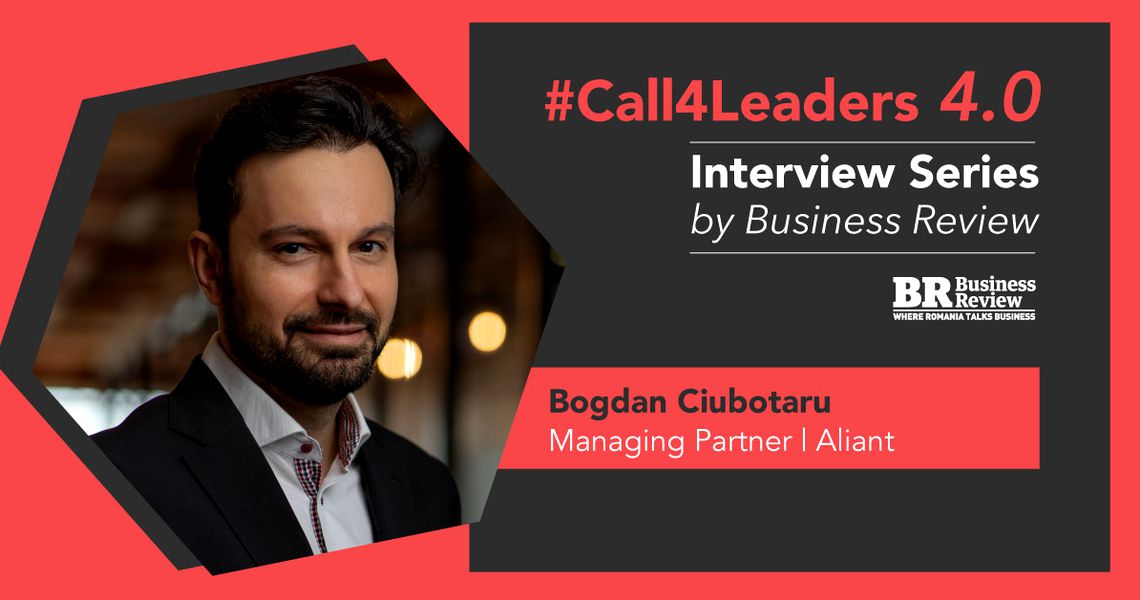In another episode of the established interview series, the four main questions of the Call4.0Leaders project, centered around 4 main trends (resiliency and sustainability, the human-machine balance, organizational agility, and Co-opetition), were answered by Bogdan Ciubotaru, Managing Partner at Aliant.
- What projects have you carried out over the past year to make your company’s operations more sustainable and resilient?
We’re an IT integrator with a focus on digital transformation and hyper-automation, so we practice what we “preach” and deliver to our clients. Automation of various business processes of our organization creates a smaller footprint on the environment since robots can successfully accomplish jobs previously done by human operators. Technologies such as RPA, Chatbots or AR/VR help build more sustainable operations while improving performance along the way. At the same time, hyper-automation will free up key resources, allowing more time and energy towards actions such as managing risk, reviewing and constantly improving processes, which in turn build up a healthy resilience on all operational levels.
- How can we find the right balance between intelligent machines and human intelligence in the new business reality of accelerated automation and digitalization?
I do not think in terms of balance between AI and human intelligence, but rather complementarity in making companies ultra-performant and adapted to evolving market needs, while easing human work and providing decision-ready information from vast amounts of data. The simple truth is that AI does a better job when it comes to specific tasks, especially tasks that are repetitive, standardized, etc, so that employees have a great opportunity to develop and contribute to other areas, closer to the company’s value stream.
In the end, the greater purpose is to use AI in a responsible manner so that we’re able to solve truly pressing global problems, making life better for everyone along the way.
- Are flatter, more agile structures better equipped to succeed in the new reality than their more traditional and rigid counterparts? How would you describe your organization in this regard?
Organizations with flatter structures or agile practices have the potential to perform significantly better while creating engaging and positive work environments. However, these frameworks alone will not suffice.
If people do not have the right mindset, the understanding of the “why we’re doing this” and do not embrace this practice, where there is no longer a centralized decision and leadership becomes distributed, empowering individuals to take initiative, act autonomously and proactively, then you’ll end up with a sort of improperly managed chaos. People need to be part of this process from day 1, to make sure that the new flatter and more agile framework is well suited, understood and adapted for the journey.
In Aliant we’re encouraging people to take charge, assume leadership and make decisions. Everyone can bring an idea to the table and we discuss it. If it has potential, we create the right conditions for it to happen. If it’s a hit, everybody wins, if it fails, we make sure that all of us learn from it. One recent example of such intrapreneurial endeavor is our new hi-tech division, Tengen, which is centered around total experience solutions to digitally transform organizations.
We believe that good leaders grow teams that are motivated, perform well in autonomous mode and are able to find solutions through consensus. We made progress in this direction, but we’re aware we still have lots of things to learn and do.
- Is the business world evolving from a competition mindset to a co-opetition one? How integrated is your company in this regard and what can you tell us about the partnerships you carried out with other organizations?
Our position as a technology integrator creates opportunities to build valuable and sustainable partnerships with tech providers. We learn from each other and find better ways to address customers’ needs.
Some of our partners have been with us since the very beginning, going back to 1992 – Xerox is a good example of a trusted and valuable partner here, as we’ve been working closely with them for 30 years. As the technology and the market evolved, we gradually built more reliable partnerships with companies such Fujitsu, Dell, Microsoft, HP, Fortinet, Lenovo or Cisco, to name just a few.
As part of our strategy to provide hyper-automation and digital solutions to companies, we started productive collaborations with partners such as Tailent, Druid, CareAR and Plant An App. Having a common set of values with all of our partners is essential since it builds trust and the ability to share experiences and discuss ways to create added value for the customers.




Comments